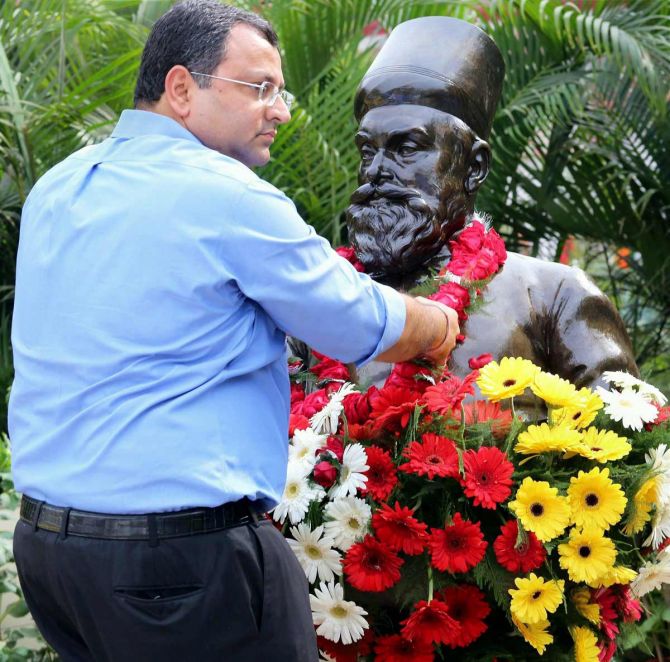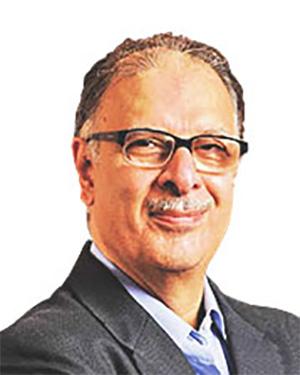'The main thing Cyrus left is to tell us that you can be a business leader by being good.'
'He practiced that in all of his dealings, in all of his decisions -- in the way he thought, the way he behaved and indeed as he spoke.'

Cyrus Mistry always had in Nawshir H Mirza a staunch admirer and supporter.
Mirza, 74, joined accounting firm Ernst & Young at age 17 in Kolkata and worked his way up the ranks, through 36 years, moving to Mumbai, becoming a partner (with only, interestingly, a brief break in 1972 to work as a factory accountant at a Gujarat Tata Textiles plant).
He subsequently was an independent director on several key company boards, including two Tata boards and eventually came to know Mistry -- who was chairman of Tata Sons till his removal in October 2016 -- reasonably well.
The admiration grew to be mutual, which lead Cyrus Mistry to once remark to The Economic Times: 'He is one of a dying breed of fiercely independent directors that speaks his mind without hesitation, peppered with a sense of humour'.
When Cyrus was ousted as chairman of Tata Sons, Mirza stood steadfastly with Mistry and said at the time 'We all said he is a good chairman and has contributed good value to the board and to the management'.
Last Sunday, Mirza learned of Mistry's untimely death hardly half an hour after the fateful crash on the Surya river near Chiroti village in Palghar, Maharashtra, and recalled to Rediff.com the deep, bottomless sense of sadness he felt at the passing of a simple, honest man full of "undiluted goodness".
"He always practiced being good. I think that (sets him) him apart -- because I'm an old man and I've seen many business leaders -- and they are all outstanding in their own individual ways. But I don't think any of them could claim at being (capable of) almost undiluted goodness," Mirza tells Vaihayasi Pande Daniel/Rediff.com.
You had many an occasion to interact with Mr Cyrus Mistry. What was he like and what was rather special about him?
He was a very understated person with absolutely no airs. And to think that he held such a high position and he himself had enormous personal wealth as a member of the Shapoorji Pallonji family.
You would never have guessed that from the way he interacted with people. Absolutely no airs at all. Very simple, down-to-earth, honest person.
You could be totally frank, brutally frank with him. And he took it well. Sometimes I would say things, which on reflection, I would (now) say maybe I shouldn't have put it that strongly. After all I do have to respect a person at that level. But he always took it very, very, well. And sportingly, of course.
Even more than sportingly, he was accepting of the point you were making. Somebody else may well have felt (or thought to themself) 'Stay in your place'.
To give you an illustration, I carried out a campaign to get him to reduce his weight. He always joked that 'My wife must have put you up to this'.
This was none of my business, I was an independent director. Since I was a lead director, I said, 'Look Cyrus, it's important for me that I don't have a chairman who could have a heart attack when the company is in a critical situation. It's important for me, and for all of us, that you are a healthy person'.
If I had said this to almost any other business head, he would have said, 'Mind your own business and I know what I need to do about my personal life.'
So, Cyrus was that kind of person.
And the tragedy is that he died so young for reasons unrelated to a heart attack...
Nothing related. Absolutely correct. Very, very, unfortunate.
And what else would you like to say about him?
What I'd also say about him was: Unlike most business leaders, whose obituaries would talk about -- how shall I put it? -- to most business leaders you would ascribe to them the Ozymandian* creation they left for us and they left for society. I would not underplay that. Those perhaps are of equal importance.
The main thing Cyrus left is to tell us that you can be a business leader by being good. He practiced that in all of his dealings, in all of his decisions -- in the way he thought, the way he behaved and indeed as he spoke.
He always practiced being good.
I think that (sets him) him apart -- because I'm an old man and I've seen many business leaders -- and they are all outstanding in their own individual ways. But I don't think any of them could claim at being (capable of) almost undiluted goodness.
I could not identify anything in him that (indicated) there was a taint of not being good -- being bad would be putting it strongly -- but not even a taint of not being good. This is my view.
And what does his passing means to India or business?
What it means for the world of business: To be absolutely frank -- as I would be if he'd asked me this question -- I don't think it matters a great deal.
The world moves on. He was one man. Shapoorji Pallonji is not one of India's major groups.
I don't think it's going to really make such a big difference to the world of business, except that it removes one more individual who could be -- what I just said -- good and still succeed in business.
So, there is one less of those.
There were anyway, very, very few... very, very few. And apart from Nadir Godrej (industrialist with the Godrej group), who is another one I can think of; there are not many I can think of in that category. It removes one more individual (who worked) in a traditional type of business.
It's easy to be good in the IT sector and so on, because the government has nothing to do with it. You can run (an IT) business as good as you want to or as crooked as you want to.
But in the traditional sector, to care for your people, to care for stakeholders, all of that and to do the right thing -- it really takes some gumption, which he had in shovels.
Would you remember when you met him first? And what was your initial recollection of him?
The first time I met him, he was a 30-year-old man.
I went to see him for the first time to tell him about my form of (working) -- I was the head of EY (Ernst & Young) then. And to tell him about EY and all that sort of thing.
As I was sitting in his office, speaking to him, in walked his father. It was such an indication: His father walked up to him and obviously they had not met that morning, so he said: 'Hi Cyrus' or whatever, I forget what he said, and he bent down and kissed him on both cheeks.
Now to do that in the office in front of some outsider -- neither Cyrus nor his father had ever seen or heard of me before -- tells you something about the kind of relationship the family had. So that was the first time we met.
Later, of course, when he became the chairman, I met him I think on the second or third day after he became chairman.
By then I had been on the board of Tata Power for several years. In fact, it was a coincidence. He was kicked upstairs from the board of Tata Power to the board of Tata Sons. And I took his place in Tata Power, but we had not actually met then (when he came onto the board of Tata Power in 2006).
The second time I met him (when he had been appointed chairman of the Tata group) he was exactly what I've just described him as -- completely unassuming, he completely put you at ease.
This is a man who... Most men would have said 'Okay, Ratan Tata has gone out, so I move into his office'. Ratan Tata had a nice office.
He refused to. He took one of the other offices on that floor, the kind that was occupied by many other heads of Tata Sons functions. And he was perfectly happy there till his last day.
I asked him that very first day, 'Cyrus, why haven't you moved into RNT's office?'
He said, 'No, no, I think it's too early for me to do that. Let me prove myself'.
Of course, he didn't prove himself (because) he never had the opportunity and because he was out before much time had passed.
What you are describing about his goodness: That can only come from a family background?
Yes, yes, indeed I agree. Obviously, his father behaved that way. So that was inherited by the sons.
You came to know him quite well. Any little anecdotes or interesting little habits?
Once he said to me, to my surprise, 'you know Nawshir I was a judoka, a judo exponent'.
My quip was: 'Cyrus, judo is a form in which you use the opponent's weight to defeat them. But in your case, at 115 kg, judo is not a sport you need to know, because you can use your own weight to defeat the opponent'.
Most people didn't know that when he was young, he learned judo and he was quite an avid judoka.
The one thing he enjoyed enormously, of course, was food.
What did he like to eat? Parsi food or any cuisine?
Yes, certainly Parsi food. Of course, he did.
But I wouldn't say he stopped at that. He liked any food that was good.
He was, I understand, very low key. But was he like a jovial man, a nice man to be around, a fun man?
Yes, he was. He would be completely relaxed. So yes, he was fun. Meetings, which he presided over, were not unduly serious.
 IMAGE: Nawshir H Mirza. Photograph: Kind courtesy Tatapowerrenewables.com
IMAGE: Nawshir H Mirza. Photograph: Kind courtesy Tatapowerrenewables.comHow often would you meet?
About once a month, I would go and spend about half an hour with him. He would look forward to it. At least that's what he said. Maybe he was just being kind to me (smile in his voice).
Half an hour at his home or in his office?
In his office. I think he kept a clear distinction between home and office. I was not that intimate a personal friend. I'm sure his personal friends met him at home. I don't know. But since I was not in that group, I would always meet him at his office.
Though, as you said, he came from a lot of money, I believe he didn't sort of give off that whiff of money. Is that correct?
Oh, yes, yes, he did not. Absolutely correct. I never felt that.
It's not as if he would talk about things that involved a lot of expenditure or big (money).
As I said at the beginning (of this interview): Nobody would have guessed that he held such an important position and had such a great deal of wealth.
He chose simple clothes and simple cars and did not flaunt his wealth?
Yes, yes. Simple. He dressed simply. No, no, no, nothing. Nothing.
And how did you hear about his passing?
Within half an hour or so, my wife got the news. She told me and we were all so shocked.
When you first heard what did you feel? Of course, there was sadness but what else?
Indeed sadness. Disbelief for quite a while that I would never ever see him again.
*Ozymandias is a sonnet by British romantic poet, Percy Bysshe Shelley that refers to a statue on which are inscribed the words 'My name is Ozymandias, king of kings, look on my works ye mighty and despair'. It's a reference to the Egyptian the third pharaoh Ramses II, the city-and-monument-building god-king, who was then the most mighty on earth, and his achievements through his works were incomparable. He was second to none. Ozymandias is the Greek title for Ramses II.
Feature Presentation: Ashish Narsale/Rediff.com











 © 2025
© 2025